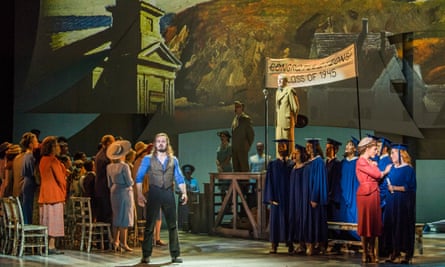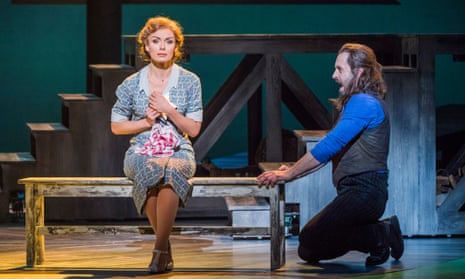After Sweeney Todd with Bryn Terfel and Emma Thompson, and Sunset Boulevard with Glenn Close, this is the third of English National Opera’s semi-staged musicals and it is an almost total joy. Since the Rodgers and Hammerstein classic was recently lovingly revived by Opera North, there is not the same sense of rediscovery that there was with last year’s Sunset Boulevard. But it is a pleasure to hear singers of the calibre of Alfie Boe and Katherine Jenkins in the lead roles and to luxuriate in a 42-piece orchestra bringing out the rich colours of Rodgers’s score.
What strikes one is the adventurousness of the show itself. Its hero, Billy Bigelow – as in the source material, Ferenc Molnár’s Liliom – is a fairground barker who resorts to violence to cover his inarticulacy: even if one jibs at the acceptance of this by his wife, Julie, there are strange parallels, as Alfred Hickling has pointed out, with another protagonist of a musical work from 1945, Peter Grimes. But it is the radical re-imagining of the musical form that impresses. In place of an overture we get the Carousel waltz that introduces the story’s key elements in pantomime. In Billy’s Soliloquy, the show also pioneered the character-defining monologue, which was to become a feature of shows such as Gypsy and Sweeney Todd.

The only paradox about Lonny Price’s excellent revival is the use of the term “semi- staged”: it looks pretty complete to me. James Noone’s designs, projecting images of a New England fishing village on to a set of curved sails, have the subdued beauty of Andrew Wyeth’s paintings. Josh Rhodes’s choreography is a full-blooded affair, at its best in a hornpipe that the dancers perform with virile agility. The ENO orchestra, under the baton of David Charles Abell, also occupies a raised platform and becomes a visible part of the experience: even that over-used anthem, You’ll Never Walk Alone, is rescued from its football associations by our being able to see the accompanying harpist as well as hear the un-churchy voice of Brenda Edwards.
Billy himself is the show’s problem: how do we warm to a man who abuses women? The opening sequence reminds us that he was the product of domestic violence. Boe also admirably conveys the character’s complexity, combining a bear-like roughness with hints of an underlying gentleness: the big switch in his soliloquy when he suddenly imagines what it would be like to have a daughter – “you can have fun with a son but you have to be a father to a girl”– is beautifully done. Meanwhile Jenkins’s Julie is no passive victim but a hard-headed realist who knows perfectly well what she is getting into: she renders her big numbers – especially What’s the Use of Wond’rin’ – with a rapt sincerity that perfectly conveys the confusions of love.
There is good support, as the show’s second couple, from Alex Young as Carrie and Gavin Spokes as an Enoch Snow who moves from mooncalf idiot to sanctimonious capitalist. Even if my interest wanes when we get to the sententious Starmaker, Nicholas Lyndhurst lends him a silvery dignity and Derek Hagen as Billy’s evil tempter and Susan Kyd as the carousel’s earthy proprietor are both sharply defined. It is said that Molnár refused Puccini permission to turn his play into an opera. Watching this production, you’re glad that it fell to Rodgers and Hammerstein to make it into a sombrely memorable musical.

Comments (…)
Sign in or create your Guardian account to join the discussion